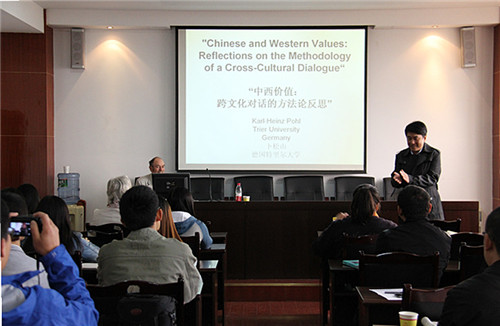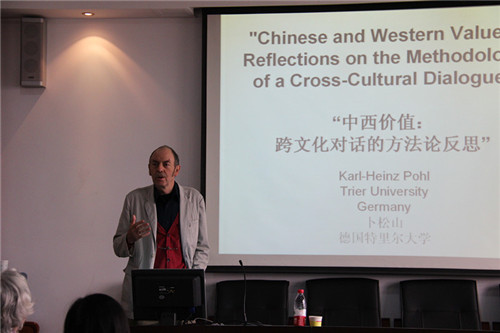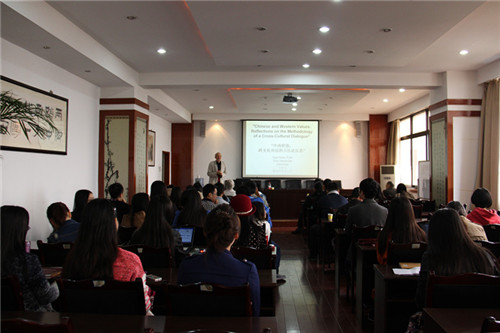Once again, Prof. Karl-Heinz Pohl from Tier University, a renowned German Sinologist, delivered a lecture entitled “Chinese and Western Values: Reflections on the Methodology of a Cross-Cultural Dialogue” in the lecture hall of the School of Foreign Languages (SFL) on Jiuli Campus on Oct. 13th, 2014. Wang Weimin, the Excutive Vice Dean of SFL presided over the lecture which is the second of the series of lectures by Prof. Karl-Heinz Pohl after the one of “China in the Eyes of Europeans” on Oct. 10th.

Prof. Karl-Heinz Pohl first quoted Max Weber’s definition of culture and indicated that culture is not a static being. Instead, it always evolves with the time. Culture embodies the differences within a cultural group and in-between various cultural groups. Though the dialogue between two cultural groups takes place on the basis of equality, more than often the two groups are not equal due to the imbalance of political, economic, cultural and military powers between them. Consequently, the cross-cultural dialogue is easily caught in the common pitfall: judging and criticizing others' practice without taking their history into account. He said we should judge the different development stages of “western world” and “the other regions” from the perspective of historical relativism. The relationship between teachers and students should be emulated. Most importantly, the cross-cultural dialogue is not a one-way process but an interaction to promote mutual understanding.

Then, Prof. Karl-Heinz Pohl came to the origins of Chinese and western value systems respectively. Christianity, he said, is the root of western society. The development of science and military technology motivated by the discovery of new continent made the originally Christian based value system universal in the age of colonialism and imperialism. The new Western Post-Christian “civil religion” takes its form and encompasses characteristics of individualism, rationalism, scientism and ideology of progress. Similar to the almost unnoticeable secularization of Christianity in western society, Confucianism has assumed the same role as that of Christianity, exerting a far-reaching influence on China and the East Asia. Confucianism also claims universal relevance of its teaching, however, it lacks the zealous missionary spirit. Acting once as the exemplary teaching of a harmonious social and moral order, it disappeared with the end of imperial China. The Post-Confucianism became the ethical basis of Chinese society. The relationship between the Chinese and western cultures is manifested in the conflicts and exchanges between the pairs of cultures of Status (Hierarchy) and Equality, of Consensus (Harmony) and Contention, of the Particularistic (Relationships) and Universalistic (Laws), of Shame (Face) and Guilt as well as those of Learning and Teaching.
Pohl concluded his lecture with the summarization of the four key points in cross-culture dialogue, i.e., historical reflection and awareness of our own standards, getting to know the respective other culture, in particular, the logics of its value system, search for common concepts, and openness towards the other and willingness to be informed by the other. Unlike East Asia with a history of learning from cross-culture dialogue with western world for over one century, he mentioned at the end of his speech, the western world is now willing to listen to the intellectuals from other countries and to find solutions to social and eco-crisis problems facing them.

During the Q and A section, Prof. Karl-Heinz Pohl discussed with teachers and students on the American model, universal value of western world and the cultural difference between China and Japan as well as the development of their relationship.